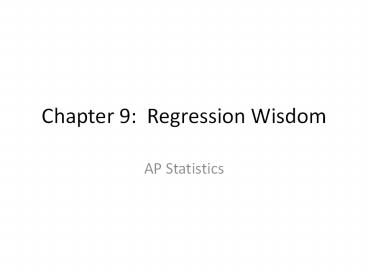Chapter 9: Regression Wisdom - PowerPoint PPT Presentation
1 / 15
Title:
Chapter 9: Regression Wisdom
Description:
Chapter 9: Regression Wisdom AP Statistics Other Regression Issues Subsets Dangers of extrapolation Possible effects of outliers, high leverage, and influential ... – PowerPoint PPT presentation
Number of Views:124
Avg rating:3.0/5.0
Title: Chapter 9: Regression Wisdom
1
Chapter 9 Regression Wisdom
- AP Statistics
2
Other Regression Issues
- Subsets
- Dangers of extrapolation
- Possible effects of outliers, high leverage, and
influential points - Problems with regression of summary data
- Mistakes of inferring causation
3
Subsets
4
Extrapolation
- The farther our x value is from the mean of x,
the less we trust our predicted value. - Once we venture into new x territory our
predicted value is an extrapolation. - Our extrapolation is not reliable because we are
operating under the assumption that the
relationship between x and y has changed, even
for these extreme values of x. - Dont extrapolate into the future!!!!!!!!
5
Extrapolation
6
The Effects of Unusual Points
- Influential Points
- Must dramatically influences the slope of the
LSRL. - May change the correlation coefficient, depending
upon where it is placed. - Outliers
- If the point is unusual in the scatterplotnot
based on the unusualness for one-variable - May or may not be influential
7
Unusual Points
8
Unusual Points
9
Unusual Points
10
Lurking Variables and Causation
- With observational data, as opposed to designed
experiments, there is not way to be sure that a
lurking variable is not the cause of any apparent
association. - The lurking variable is some third variable (not
the explanatory or predictor variable) that is
driving both variables you have observed.
11
Lurking Variables and Causationz is the lurking
variable
12
Lurking Variables and Causation
- There have been many studies showing a strong
positive association between hours spent in
religious activities (going to church, attending
religious classes, praying, etc) and life
expectancy. NOT CAUSATION. There is confounding
variableon average, people who attend religious
activities also take better care of themselves
than non-church attendants. They are also less
likely to smoke, more likely to exercise and less
likely to be overweight. These effects of good
habits (lurking variables) are confounded with
the direct effects of attending religious
activities.
13
Working With Summary Values
- Be cautious when working with data values that
are summaries, such as mean and medians. - These values have less variability and therefore
inflate the strength of the relationship
(correlation).
14
Summary Data
15
All Data Points































